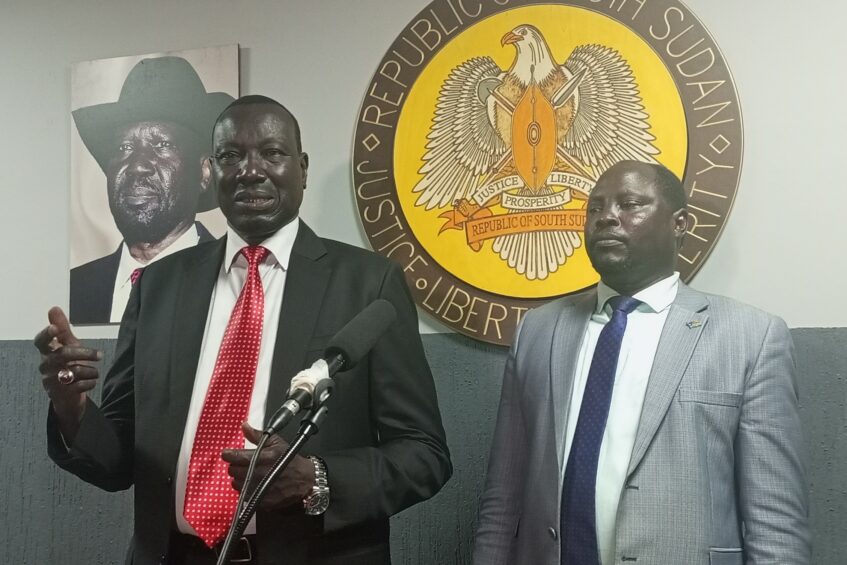
Minister of Finance and Planning Agak Achuil (left) and Hon. Changkuoth Bichok, Chairperson of the Parliamentary Committee on Economy jointly address the media after a summon of three ministers by the parliament. | 26th July 2022. | Charles Wote/Eye Radio.
Kenyans are heading to polls a week from now to elect a new president, amid a tense campaign that has compelled importers using the Mombasa port to shift gears and seek alternative routes.
Parliaments across inland nations continue to debate and explore ways to ensure constant supply of essential commodities, and South Sudan is not shielded from the unforeseen consequences of the Kenyan elections.
Already struggling with inflation and skyrocketing prices, the country’s parliament summoned three economic cluster ministers Tuesday, to explain the reason behind the dwindling economy and high cost of living.
The Specialized Committee on Economy at the national parliament summoned the Ministers of Finance, Transport, Trade and the Commissioners of revenue generating institutions to explain the loopholes behind the hardships.
During the sitting, the parliament said it discovered irregularities around transit routes and unnecessary taxes levied on business persons importing goods into South Sudan.
The August House said the excessive taxes have partly contributed to the high prices of essential goods in the market.
It then directed the Minister of Finance to suspend all unnecessary tax collections with immediate effect.
The Committee also directed the Minister of Transport to suspend the controversial transfer of the clearing of cargoes destined for South Sudan from Port Mombasa to a private Freight terminal in Nairobi.
The order was echoed by the South Sudan freight forwarders in Mombasa, who urged the government to address confusions around transit routes and illegal taxes before the Kenyan general elections.
Emmanuel Kachoul is the Chairperson of South Sudan freight forwarder Association in Mombasa.
Speaking to Eye Radio, he said addressing the illegalities will help the country have surplus stock of commodities as an alternative before the Kenyan general elections.
“If the elections come and get us before all these things are done, the common man will be the one now to bear the cost. When Kenyans go now for elections, the government will be dissolved and when the government of Kenya is dissolved, then now how are you going to handle this thing?” he said.

“It is really a call, let the government move with a speed to address and resolve this problem. If they do not resolve this issue now, especially taking back our cargoes and also scraped out this unnecessary collections of money in Nairobi,” he added.
The importer said if the random taxation is not addressed, traders will continue to compensate their loses at the expense of the common man.
South Sudan is landlocked country in the region, and has a significantly underdeveloped agricultural sector, in which only 4 of the 70 percent of fertile land has been put to use.
The country depends entirely on its neighboring countries such as Uganda and Kenya for most of its basic needs.
But, the country is currently grappling with multiple shocks such as the years of conflict, flood disaster, the current global economic crisis and the COVID-19 pandemic.
Despite the injection of millions of US dollars to stabilize the market, the economy continues to deteriorate.
As of Thursday, 1 US dollars is being sold at 637 according to the official daily exchange rate at the Bank of South Sudan.
Administrative wrangle between NRA and Customs Service Division
Last month, President Salva Kiir issued a Republican Order transferring the Customs Service to be under the supervision of the National Revenue Authority.
Kiir however did not spell out the mandates of each institution.
This has resulted into administrative wrangles between the National Revenue Authority and Customs Service Division, which reportedly continues to aid malpractices in the collection of non oil revenues.
Last year, the Customs Service division announced the introduction of a mandatory “certificate of destination” which became effective on 1st December 2021.
The notice stated that “to this end, the Customs Division has introduced the Certificate of destination, issued online through the https://customs.eservices.gov.ss/ portal.
According to the notice, the order was to enable the government to monitor all imports into South Sudan in real-time.
It added that any intention to provide false or misleading information during the online declaration will attract a fine of up to $10,000.
However, on 11th May 2022, the Commissioner for Customs Service Division, Maj. Gen. Akol Ayii Madut revoked the certificate of destination and introduced what he referred to as South Sudan accreditation permit at the Mombasa monitoring station.
According to Ayii, the new order which became effective on 1st June 2022 is obtained online via www.mombasa.customs.nra.gov.ss at the standard fees for all application of only $250.
On 27th June 2022, the Chief of Customs, Nairobi Station wrote a notice titled, “Ref: Consignments destined to South Sudan and the Mombasa and Nairobi freight station.”
In a letter seen by Eye Radio, Kuel Abraham Manyuat said he was re-enforcing the directives from his boss to combat malpractices.
“As a tool to combat the malpractices being carried out by the clearing agents at Nimule border, goods entering South Sudan will be required to enter a ‘accreditation permit application number’ before proceeding to the next stage of the e-customs portal for tax calculations.” reads part of the notice obtained by Eye Radio.
Earlier, the Commissioner General of NRA, Dr. Patrick Mugoya urged the Commissioner General of Uganda and Kenyan Revenue Authorities to only accept formal communication from NRA South Sudan.
“Recently, there have been several communications regarding Customs clearance of cargo into the Republic of South Sudan.”
“Some of these have lacked clarity or are inconsistent with existing South Sudan Customs law.”
“The purpose of this communication is to inform you that all formal communications regarding changes in procedures and requirements for clearance of cargoes through South Sudan customs shall be issued only by the National Revenue Authority (NRA) as it is the sole authority mandated to administer the customs service,” Dr. Mugaya clarified in a letter dated 13th December 2021.
Despite attempts to effect transparency in the collections of non-oil revenue in the country, the figure of collections remained undisclosed to the public.
Business persons importing goods into the country however say the Customs officials deployed on the transit routes levy taxes on imported goods despite cancellations.
“The new South Sudan customs officers deployed in Nairobi private freight terminal are still collecting $250 per container despite the directives from Hon. Kuol Athian, Minister of Trade and Industry.”
Reads a comparative study on forced transfer of South Sudan cargo by Standard Gauge Railway to Nairobi freight terminals.
The three-page document dated 11th July 2022 gives a comparison of the costs of transportation from Mombasa to Nairobi by railway, Nairobi to Juba by road and from Mombasa to Juba by road.
In June, the Minister of Trade and Industry, Kuol Athian Mawien issued another Ministerial order to cancel the certificate of destination and new South Sudan accreditation permit.
“In exercise of the powers conferred upon me under article 114 (1) of the transitional constitution of the Republic of South Sudan 2011, as amended in 2015 read together with article 18 (b) of the imports and exports Act 2012.”
“I Kuol Athian Mawein, Minister of Trade and Industry ……do hereby issue this Ministerial order No. 23/2022 AD for the cancellation of the order of the certificate of destination and new South Sudan permit accreditation,” the order reads.
But, in defiance of his order, a $250 was paid through Capital Pay as service fees to the eServices.gov.ss.
The controversial shifting of clearance from Port Mombasa to Nairobi Freight Terminal
Both the South Sudan Minister of Transport and the Commissioner of Customs Service have supported a move to transfer South Sudan goods from Mombasa to Nairobi Container terminal.
In March 2022, the Kenyan Cabinet Secretary James Macharia welcomed the efficiency of delivery of South Sudan Cargo from the port of Mombasa through Nairobi freight terminal.
“I sincerely take this opportunity to appreciate the recognition by the government of the Republic of South Sudan that we have invested heavily in the development and management of railway and port facilities to support efficient handling and transportation of cargo to and from the port of Mombasa.” Macharia said in a two page document addressed to the South Sudan Minister of Transport Madut Biar.
“The decision by your government to use Nairobi Freight Terminal facility is a clear expression of the confidence you have in our facility which is served by the SGR and us adequately equipped to handle containerized nd conventional cargo to and from South Sudan with a view to reducing the distance to Juba from Mombasa by 489 km.” the letter adds.
But a group of South Sudanese Freight Forwarders Association early this month presented an assessment report criticizing the move by the government.
The Kenya Standard Gauge railway (SGR) network along the northern corridor is a regional initiative to address transport challenges in the community.
In May 2022, a private sector technical assessment team from Uganda, Rwanda, DR Congo and South Sudan visited Naivasha to assess the facility.
The private sector, after assessing the facility, recommended that inland container depot that use standard gauge Railway should remain optional for all transit cargo destined to landlocked countries such as Uganda, Rwanda, DR Congo, Burundi and South Sudan.
This according to the assessment team was to allow the shippers to choose the appropriate mode of transportation of their choice.
In comparison the South Sudanese Freight Forwarders Association said transporting cargo by railway to Nairobi and by road to Juba is expensive.
“Cost effective of transportation of cargo using SGR (Standard Gauge Railway) show that the current average total transport for 20ft ad 40 ft containers from Mombasa to Juba by rail transport is $6000 and $6,300 respectively.”
It adds that “as compared to transportation for 20ft and 40ft containers from Mombasa to Juba by road which is $5,200 and 5,500 respective.” reads the report.
The assessment report further states that ICD charges in Nairobi plus SGR amounts to $300 while Mombasa port charges $205.
But addressing the law makers on Tuesday, the Minister of Transport Madut Biar dismissed the report saying using Standard Gauge railway is cheaper.
“South Sudan is a member of norther corridor and the Ministry direct in our Country is the Ministry of transport. Before me they [ministers] were attending the meetings of norther corridor, Ministry of transport not Ministry of trade that is why I came in to facilitate, to reduce the transport cost.”
The use of Kenyan Standard Gauge railway is also backed by the South Sudan International Freight and Warehousing Association.
On June 15th 2022, the group appealed to the Minister of trade to disregard negative attempt to compromise the progress on the logistic arrangement to collect transit cargo destined to South Sudan.
“Through the support of the Ministries in charge of transport of the Republic of Kenya and the Republic of South Sudan, the Kenya railways corporation has provided South Sudanese with good discount charges for rail transportation cost.”
“The Nairobi Freight terminal has provided longer stay of South Sudanese transit goods in their facility without incurring storage charges.” Adau Kuol Biong Secretary General, South Sudan Freight and Warehouse Association disclosed.
Support Eye Radio, the first independent radio broadcaster of news, information & entertainment in South Sudan.
Make a monthly or a one off contribution.
Copyright 2024. All rights reserved. Eye Radio is a product of Eye Media Limited.